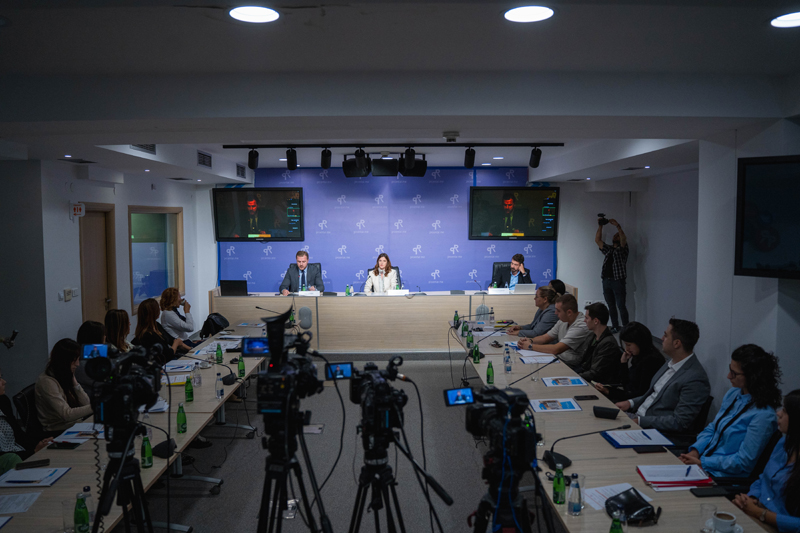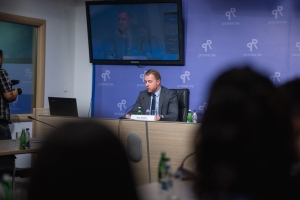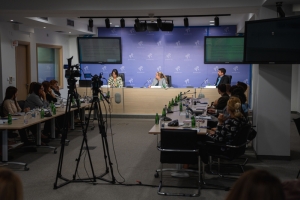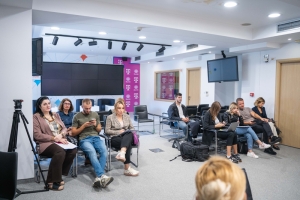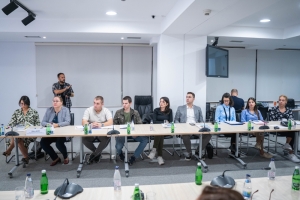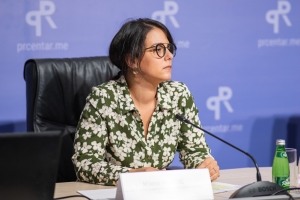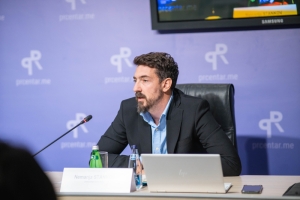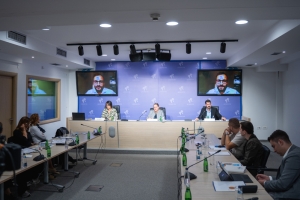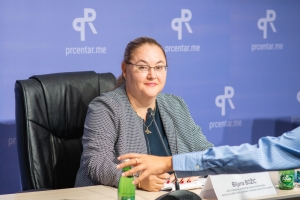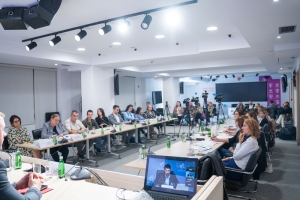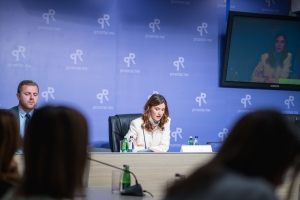Increasingly frequent abuses of the right to free access to information negatively affect the work of state institutions in Montenegro, overloading their system and reducing the possibility of efficient processing of legitimate requests. It is also necessary to digitize the archive in order to use it more quickly and efficiently.
This was announced at the round table "Openness of Public Administration, Space for Improvement", organized by the Centre for Monitoring and Research (CeMI), and financially supported by the Ministry of Public Administration of Montenegro.
The Program Director, CeMI, Teodora Gilic, said that, at a time when information is one of the most important resources, the right to free access to information is of great importance for ensuring transparency, accountability and participatory democracy.
"The Constitution of Montenegro guarantees this right, and the Law on Free Access to Information regulates in detail the ways in which citizens can request and obtain information held by state bodies and organizations performing public functions." However, it is not enough to just adopt the law, it is also important to ensure its consistent and effective application," Gilic pointed out.
According to her, research conducted by CeMI shows that, although the number of submitted applications increased from 5,923 in 2019 to 7,128 in 2023, the percentage of fully approved applications decreased from 54 percent in 2020 to only 32.9 percent in in 2023
"These data clearly indicate challenges in practice and the need to improve the system," said Gilic.
She pointed out that CeMI is implementing the project called "PROSPECTA: Promotion of Openness and Creation of Access for Efficient and Transparent Administration", thanks to the financial support of the Ministry of Public Administration.
"Through this project, we analyzed the implementation of the Law on Free Access to Information and identified the key obstacles that citizens and institutions face. "Three conducted surveys, which included an insight into various aspects of the application of the Law, showed that one of the biggest challenges is the lack of cooperation within the institutions," stated Gilic.
She said that officials often do not see the resolution of requests for access to information as a priority, which leads to delays and unsystematic processing of requests.
"In addition, the insufficient digitization of archives further complicates access to the requested information, while abuses of the right to free access to information have become a significant problem." She also stated that the submission of a large number of similar requests for SPI in a short period of time is often aimed at making the work of institutions more difficult, which leads to overloading the system and reducing the efficiency in processing legitimate requests.
"CeMI believes that more proactive publication of information by state authorities, more effective supervision over the application of the law would contribute to the reduction of these abuses." "Also, the introduction of legal provisions that would allow institutions to reject obviously abused requests would significantly relieve the institutions and enable them to focus on the needs of citizens," said Gilic.
She pointed out that free access to information should not only be a legal obligation, but the everyday practice of all institutions in Montenegro.
"Transparency and accountability are key to building citizens' trust and ensuring the efficient functioning of a democratic society." "CeMI will continue to propose and implement initiatives that will improve the implementation of the Law, thereby strengthening democratic institutions in Montenegro," said Gilic.
The State Secretary in the Ministry of Public Administration, Naim Gjokaj, recalled that Montenegro adopted the Law on Free Access to Information in 2005, and in 2012 passed a new law that significantly improved the transparency of state bodies.
"Amendments to this law followed in 2017, introducing new institutes, such as the reuse of information and a more advanced system of exercising the right to access information." Nevertheless, in 2019, the procedure for adopting amendments to the law was initiated, which, unfortunately, did not result in the adoption of the new law. Although the 42nd and 43rd governments sent the bill to the Parliamentary procedure, it was withdrawn due to changes in the executive branch. The latest draft law was established by the 44th Government at the end of 2023 and sent to the Parliament, but it was omitted from the agenda in June 2024 due to non-compliance with legal and technical rules," Gjokaj reminded.
Considering the importance of this law, as he said, the Ministry of Public Administration immediately started the procedure of preparing a new law.
"We conducted public consultations, published a report, and formed a working body with the participation of non-governmental organizations. Also, with the support of SIGMA, we are preparing a special analysis that will help harmonize the law with international regulations and directives. We expect that the analysis will be completed soon," said Gjokaj.
He said that only proactive publication of information can reduce the need to submit requests and improve democratic processes in the country.
"Although the current law provides a solid framework for exercising the right to free access to information, we are faced with challenges that affect the efficiency of the authorities' work and the exercise of citizens' rights," Gjokaj said.
Nemanja Stankov from the Faculty of Political Sciences presented the results of three surveys conducted by CeMI in the last seven months, which included surveying civil servants, analysis of the application of the Law on Free Access to Information and monitoring cases of abuse of this right.
"The goal of the research was to identify obstacles in the effective application of the law, but also to point out the existing challenges in communication between state institutions and citizens when it comes to access to information of public importance," explained Stankov.
He said that one of the surveys included a survey of civil servants at the national and local levels, of which about 33 percent of the respondents said that they were not sufficiently familiar with the provisions of the law.
"A significant part of them, 23 percent, were not sure whether their institution has a published Guide for free access to information on the official website, which is a legal obligation," Stankov stated.
He indicated that through the research, the focus was on the analysis of the institutions' responses.
"The lack of digitization of archives is a serious problem, because many institutions do not have adequate digital systems for storing and accessing older documents, which makes it difficult to issue requested information in a timely manner," said Stankov.
Through research, the abuse of the law was analyzed, where the main modalities of abuse were identified: cases in which the applicants sent a large number of similar requests with the aim of overloading the institutions and achieving financial benefits through court cases. "In addition to the problems with digitization and abuses, researches have pointed to shortcomings in legal regulations, especially in connection with imprecise definitions of terms such as "information of public importance". These ambiguities make it even more difficult for officials to properly apply the law, which often leads to requests being rejected," Stankov said.
He indicated that the cooperation between the first-instance authorities and the Agency for the Protection of Personal Data was assessed as ineffective due to frequent delays in resolving complaints, which undermines citizens' trust in the system.
Stankov pointed out that it is necessary to improve the education of officials on legal obligations, to digitize archives, as well as to improve the legal framework in order to enable faster, more transparent and more efficient application of the Law on Free Access to Information.
The Representative of SIGMA, Timo Ligi, pointed out that requests for free access to information do not need to be explained or justified.
"There is an obligation of authorities to proactively publish information, but how it is implemented in practice is another matter." Public information should be delivered promptly, in the required format, and free of charge. But we still have a big problem of the silence of the administration, that is, the administration does not respond on time. However, when it comes to abuses, the goal of certain lawyers and applicants is to silence the administration. "Effective access to legal remedies must be ensured," Ligi pointed out.
In Montenegro, as he pointed out, there are more people who believe that the Government is trying to hide information than those who think that the Government is proactively publishing information.
"If we look per capita, Montenegro has by far the most complaints related to the right to free access to information in the whole world. The agency is simply not designed to be able to handle that number of complaints or requests. There are people who submit thousands of requests which makes it impossible for us to deal with the real problems. They are trying to abuse the system to make money. The solution is for the Agency or the Administrative Court to start applying general principles that already exist in legal texts. The Law on Administrative Procedure says that the public legal body is obliged to prevent any abuse of the rights of the parties in the administrative procedure," Ligi said.
He believes that the requests cannot be labeled as abuse based on what is requested, but the manner of submitting the request is abuse and should be acted upon.
"Existing regulations can be applied more consistently and in case of non-application there should be sanctions." The final measure to promote the proactive release of information is an electronic document management system," Ligi explained.
Head of Department for Free Access to Information at Agency for Personal Data Protection and Free Access to Information, Biljana Bozic, stated that from 2019 to the end of 2023, the Agency received 28,148 complaints, and in the same period the Administrative Court received 17,165 complaints related to all items received by the Agency.
"When it comes to the silence of the administration, even when the party is satisfied with the decision subsequently made, based on the judgment of the European Court of Human Rights, the standard was adopted in the judgments of the Supreme Court and the Administrative Court, that if a decision was not made within the legally prescribed period of 15, or up to 45 days, the party receives the amount of 363 euros due to hiring a lawyer," said Bozic.
She agrees that the compensation amounts should be reduced, negligible and that the focus should be placed on the applicant himself.
"The law on administrative procedure deleted the institution of merger of proceedings." These are the six legal situations that give you the right to join the proceedings. Therefore, I suggest that, if changes cannot be made to the existing systemic law, we should use the opportunity to recognize and clearly define this through the Law on Free Access to Information," said Bozic.
The Agency for the Protection of Personal Data and Free Access to Information is, as she emphasized, an institution that brings together users, first-level authorities in a way that, with the support of SIGMA, in recent years, it organized very important trainings that included colleagues at the local level.
Lawyer and Author of the Guidelines for handling requests for access to information, Milena Nikezic, said that there is definitely an abuse of the right to free access to information and pointed out that once the Municipality of Bar received almost 200 requests before the New Year holidays.
"But on the other hand, we have citizens who are dissatisfied, because the deadlines are being missed, because often the authorities only state that they are not in actual possession of the information, without an explanation that must contain a decision rejecting the request for free access to information." The institutions do not keep up with the times. Citizens have no idea that many problems arise due to technical problems. There must be a rule book or guide for officials. Also, the deadlines for authorities are short, but for citizens the deadlines are long because they do not know the system and procedure. It seems to them that the deadline is quite enough, but we have an overcrowded system of authorities for which 15 days is too little," Nikezic explained.
The event was held within the project "PROSPECTA - Promotion of Openness and Creation of Access for Efficient and Transparent Administration", which is implemented by the NGO Centre for Monitoring and Research (CeMI) with the financial support of the Ministry of Public Administration of Montenegro.
